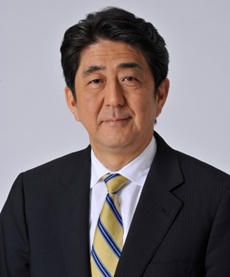Abe’s big election win bolsters Japanese markets
23 Oct 2017
Japan's ruling block led by Prime Minister Shinzo Abe's Liberal Democratic Party (LDP) scored a resounding victory in Sunday's election to the lower house, giving a fresh boost to Abe's plans to reenergise Japanese economy and lead the country out of its pacifist disposition.
 | |
| Prime Minister Shinzo Abe |
In July 2016, Abe's ruling coalition won a landslide victory in the election for parliament's upper house, notwithstanding concerns about his economic policies and plans to revisit the nation's post-war pacifist constitution for the first time. (See: Abe, allies win thumping majority in Japan upper house).
Japanese markets greeted Abe's big win with huge gains across major stocks, buoyed by the chances of Abe continuing his easy-money policy. Shares also gained from a weaker yen as an election win for Shinzo Abe's ruling bloc gave a green light for more policy stimulus.
The Nikkei share index raced up 1 per cent to its highest since 1996.
Morgan Stanley Capital International's (MSCI) broadest index of Asia-Pacific shares outside Japan held steady, while Singapore's main index reached its highest in over two years.
The yen slipped against the euro, which in turn was hammered by the Spanish government's move to end Catalans leadership's sesessionist activities.
The US dollar rose 0.2 per cent to 113.74 yen and briefly touched its highest since mid-July at 114.09 while the dollar edged up0.1 per cent against a basket of currencies.
The LDP-led coalition won a combined 312 seats, keeping its two-thirds ''super majority'' in the 465-member lower house, local media reported.
Abe who assumed office in December 2012, now looks set to secure a third three-year term as LDP leader next September and go on to become Japan's longest-serving premier.
While the US-drafted constitution's Article 9 still prevents Japan from maintaining armed forces, Japanese governments have diluted it to allow a military exclusively for self-defence.
While many back Abe's proposal to clarify the military's ambiguous status and assign a role, others fear that a move out of status quo would allow an expanded role overseas for the military.
Appearing on a TV programme on Sunday, Abe said, "We are not thinking about initiating (an amendment proposal) just among the ruling coalition. We want to enter into discussions with other parties, including the Hope party."
The LDP's fifth straight victory since Abe began his second stint as prime minister in in 2016 clears the way for him to seek a third term as party president in autumn 2018.
A special Diet session will be convened on Nov. 1 at which Abe will again be voted in as prime minister. He is expected to retain all Cabinet ministers he named in a reshuffle in early August.



















